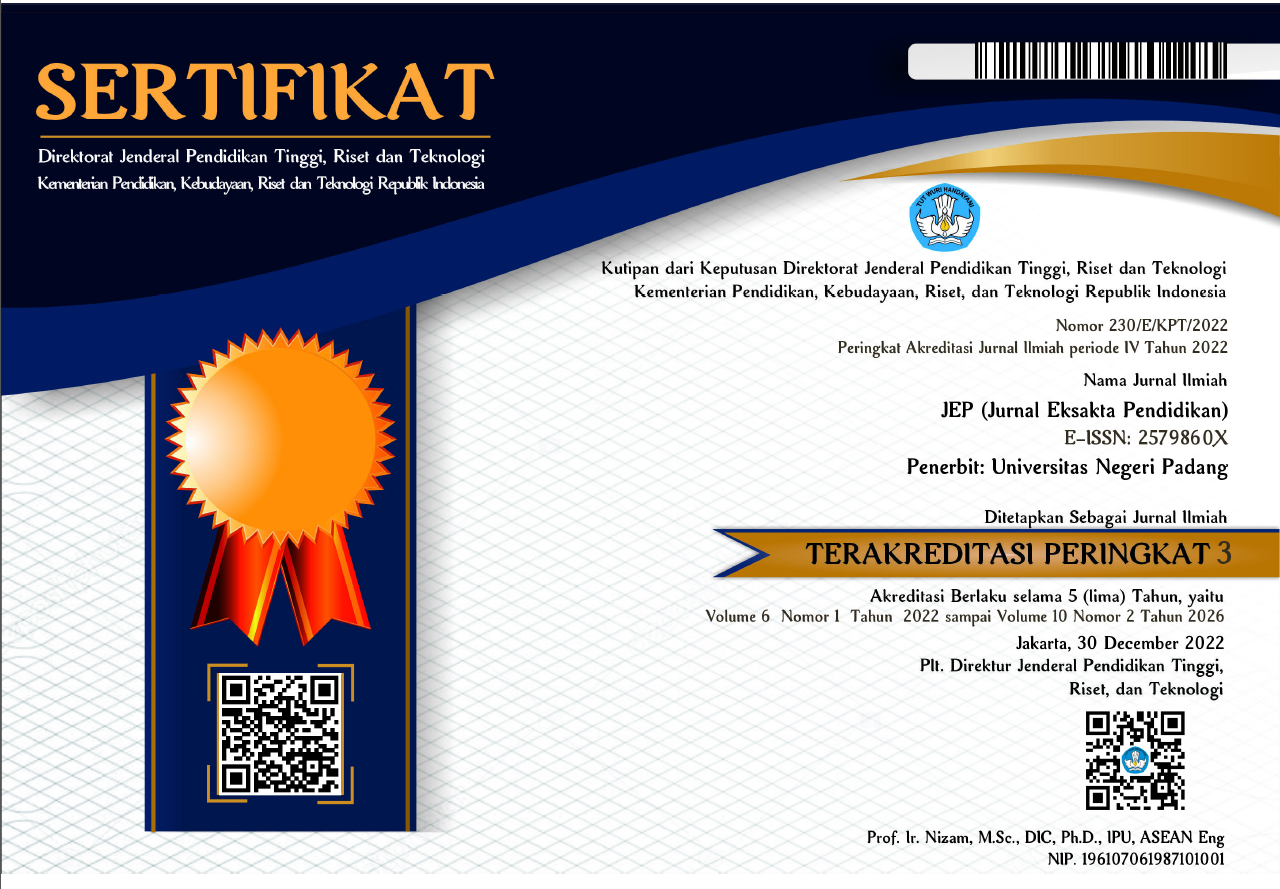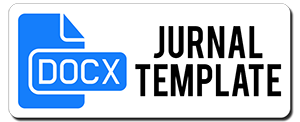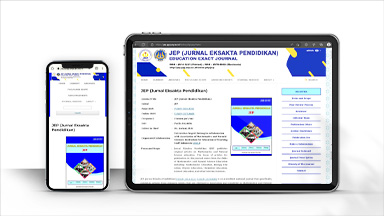Analisis Konten Buku Teks IPA Terpadu Kelas VIII Semester 1 Ditinjau Dari Aspek Literasi Saintifik
Abstract
Science learning has an important role for students to understand natural phenomena with scientific methods. Science learning is taught in an integrated manner and contains literacy in it. Skills in literacy are needed to help students understand learning resources. One type of literacy is scientific literacy. Scientific literacy is the ability to understand or get involved with science issues and ideas around the environment. Scientific literacy consists of four aspects, namely 1) the scientific context, 2) the scientific process, 3) the scientific concept and 4) the scientific attitude. This research is a descriptive research that contains a description of the object under research. The object of this research is the integrated science textbook for grade VIII in junior high school. The instrument used in the form of a questionnaire assessment of integrated science textbooks related to scientific literacy aspects. The results showed that, among the five textbooks researched, the best book reviewed in terms of the scientific context and the scientific process was book D with grades of 78.6 and 78.1, respectively. In terms of scientific concepts, the best integrated science textbooks are books A and D with a value of 82.1. Meanwhile, the integrated science textbook that is good to use is seen from the aspect of scientific attitude is book E with a value of 75. After processing the data, it is found that the best book used to improve students' scientific literacy ability is book D with a value of 77.4.
Downloads
References
Asrizal., Amran, A., Ananda, A., Festiyed., & Sumarmin, R. (2018). The Development of Integrated Science Instructional Material to Improve Students Digital Literacy in Scientific Approach. Jurnal Pendidikan Indonesia. 7: 442-450.
Asrizal., Festiyed., & Sumarmin, R. (2017). Analisis Kebutuhan Pengembangan Bahan Ajar IPA Terpadu Bermuatan Literasi Era Digital untuk Pembelajaran Siswa SMP Kelas VIII. Jurnal Eksakta Pendidikan. 1: 1-8.
Azhar, A. (2003). Media Pembelajaran. Jakarta: Raja Grafindo Persada.
Chiapetta, E. L., Fillman, D. A & Sethna, G. H. (1991). A Method to Quantify Major Themes of Scientific Literacy in Science Textbooks. Journal of research in science teaching. 28 (8): 713-725.
DeBoer, G. E. (2000). Scientific Literacy: Another Look at Its Historical and Con-temporary Meanings and Its Relation-ship to Science Education Reform. Journal Of Research In Science Teach-ing.
Fatmawati, I. N & Utari, S. (2015). Penerapan Level of Inquiry untuk Meningkatkan Literasi Sains Siswa SMP Tema Limbah dan Upaya Penanggulangannya. Edu-sains. 7: 151-159.
Festiyed. (2014, Mei). Pengembangan Generic Life Skill Siswa Menengah Pertama pada Pembelajaran Fisika. Seminar Nasional dan Rapat Tahunan Bidang MIPA. Bogor: IPB.
Festiyed. (2015). Penerapan CD Pembelajaran IPA Berbasis Siklus Belajar 5E terhadap Kompetensi Peserta Didik Kelas VIII SMP Negeri 2 Padang. Pillar of Physics Education, 6: 49-56.
Kurnia, F., Zulherman. & Fathurohman, A. (2014) Analisis Bahan Ajar Fisika SMA kelas XI di Kecamatan IndralayaUutara berdasarkan Kategori Literasi Sains. Jurnal inovasi dan pembelajaran fisika. 1: 43-47.
Nasution, M., Sipahutar, H., & Harahap, F. (2018). Analisis Ruang Lingkup Literasi Sains Buku Ajar Biologi SMA Kelas X di Kota Binjai. Prosiding Semnas ”Biologi dan Pembelaja-rannya”. Surabaya, 20 Desember 2014.
NRC (National Research Council). (1996). Nati-onal Science Education Standards. Wa-shington, DC: National Academy Press.
Nofiana, M. & Julianto, T. (2017). Profil Kemampuan Literasi Sains Siswa SMP di Kota Purwokerto Ditinjau dari Aspek Konten, Proses, dan Konteks Sains. Jurnal Sains Sosial dan Humaniora. 1: 77-84.
Nugroho, E. D. Vlorensius., Rasidah, L. H., & Anisa, N. (2017). Analisis Isi, Penyajian Materi dan Keterbacaan dalam Buku Teks IPA Kurikulum 2013 SMP Kelas VII Semester 1. Jurnal Pendidikan Biologi Indonesia. 3: 114-122.
OECD. (2015). PISA 2015 Draft Mathematic Framework. New York: Columbia University.
OECD. (2016). PISA 2015 Result in Focus. New York: Columbia University.
Retno, A. T. P., Saputro, S. & Ulfa, M. (2017). Kajian Aspek Literasi Sains pada Buku Ajar Kimia SMA Kelas XI di Kabupaten Brebes. Prosiding Seminar Nasional dan Pendidikan Sains. Surakarta, 26 Oktober 2017.
Riduwan. (2012). Skala Pengukuran Variabel-variabel Penelitian. Bandung: Alfabeta.
RTI International. (2014). Prioritizing Re-form, Innovation, and Opportunities for Reaching Indonesia’s Teachers, Admin-istrators, and Students. Pembelajaran Literasi Kelas Awal SD/MI di LPTK. United States Agency for International Development (USAID).
Rusilowati, A. (2014). Analisis Buku Ajar IPA yang digunakan di Semarang Ber-dasar-kan Muatan Literasi Sains. Pro-siding Semnas “konservasi dan kualitas pendidi-kan” . Semarang 2014.
Suastra, I. W. (2010). Model Pembelajaran Sains Berbasis Budaya Lokal untuk Mengembangkan Kompetensi Dasar Sains dan Nilai Kearifan Lokal di SMP. Jurnal Pendidikan dan Pengajaran IKIP Negeri Singaraja. 2: 8-16.
Tarigan, H. G dan Djago. T. (2009). Telaah Buku Teks Bahasa Indonesia. Ban-dung: Angkasa.
Toharudin, U. (2011). Membangun Literasi Sa-ins Peserta Didik. Bandung: Hu-maniora.
Wulandari, N., & Sholihin, H. (2015). Penera-pan Model Problem Based Learning (PBL) pada Pembelajaran IPA Terpadu untuk Meningkatkan Aspek Sikap Literasi Sains Siswa SMP. Prosiding Simposium Nasional Inovasi dan Pembelajaran Sains. Bandung, 8-9 Juni 2015.
Copyright (c) 2019 mutia risma, Rahmayani Rahmayani, Fitria Handayani

This work is licensed under a Creative Commons Attribution 4.0 International License.

This work is licensed under a Creative Commons Attribution 4.0 International License.




_(2579-860X).png)
_(2614-1221)1.png)




